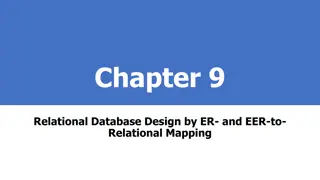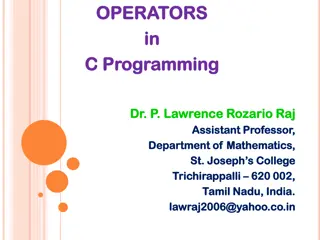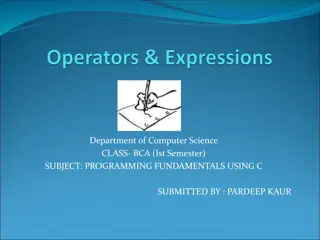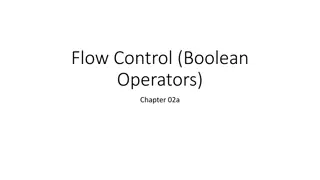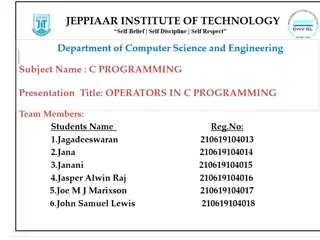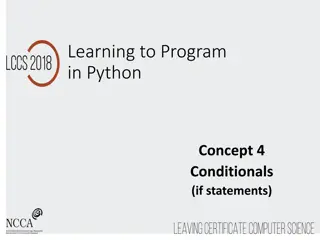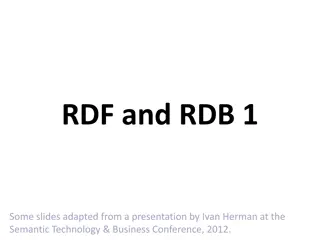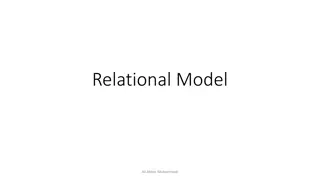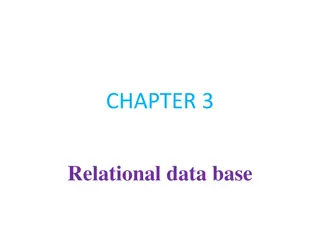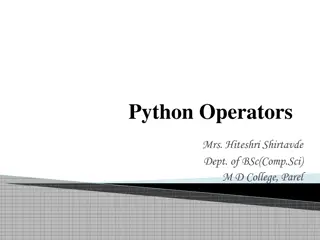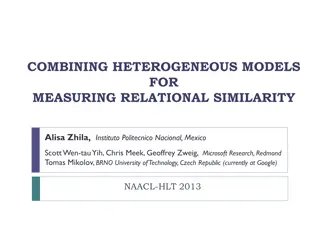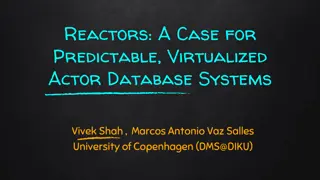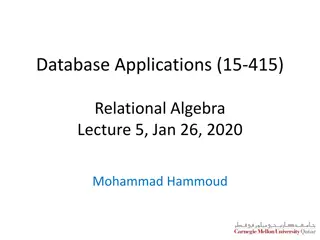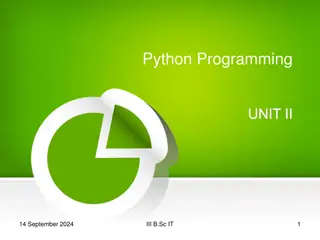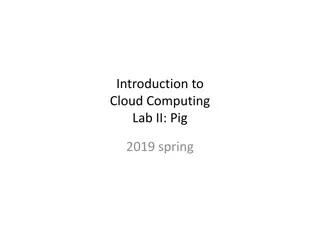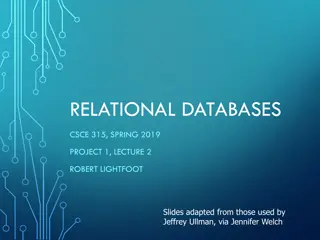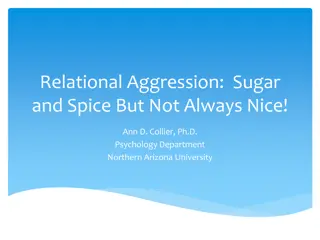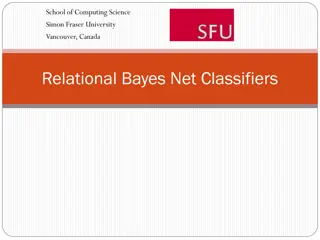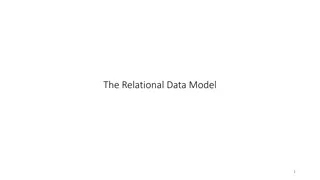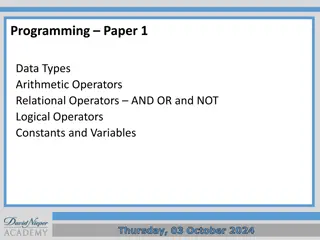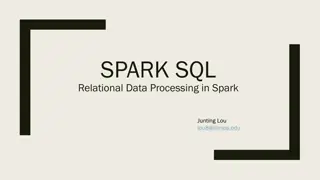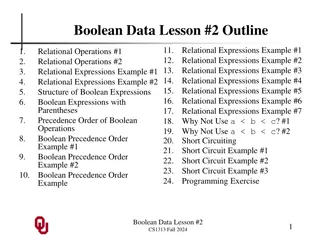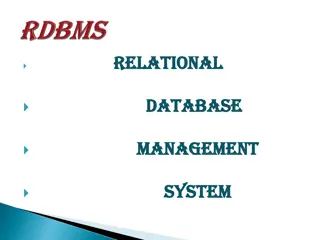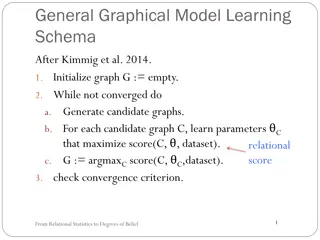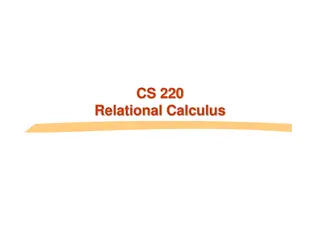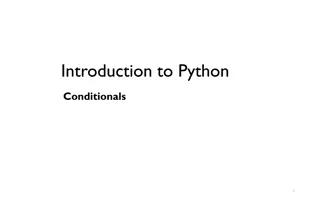Progressive Approach to Relational Entity Resolution
In this research paper authored by Yasser Altowim, Dmitri Kalashnikov, and Sharad Mehrotra, a progressive approach to relational entity resolution is presented. The study focuses on balancing cost and quality in entity resolution tasks for relational datasets. The goal is to develop a method that ac
1 views • 20 slides
Automatic Incremental View Maintenance in DBSP: A Comprehensive Overview
Analyzing the automatic incremental view maintenance for rich query languages like DBSP. Discussing concepts such as incremental computation reuse, streaming language, relational computations, streaming operators, and more. Explore the conversion of arbitrary DBSP programs to incremental ones and th
4 views • 24 slides
Understanding Relational Database Design and Mapping Techniques
Explore the process of mapping Entity-Relationship (ER) and Enhanced Entity-Relationship (EER) models to relational databases. Learn about relational model concepts, mapping algorithms, and the goals and steps involved in the mapping process. Discover how to preserve information, maintain constraint
3 views • 42 slides
Road Transport Safety Standardization: The Role of the Corps Transport Standardization Officer
The presentation highlights the Road Transport Safety Standardization policy and the role of the Corps Transport Standardization Officer in regulating fleet operators, ensuring safe transportation operations, and promoting a culture of safety consciousness. It covers the functions of the officer, im
1 views • 13 slides
Understanding Arithmetic Operators in C Programming
C programming language provides various arithmetic operators such as addition, subtraction, multiplication, division, and modulo division. Integer division truncates any fractional part, while modulo division produces the remainder of an integer division. When operands in an arithmetic expression ar
1 views • 18 slides
Introduction to Programming Fundamentals in C
Understanding operators in C programming is essential for performing mathematical and logical operations. This content covers various types of operators such as arithmetic, relational, logical, assignment, increment, decrement, conditional, bitwise, and special operators in C. It explains their func
0 views • 23 slides
Understanding Boolean Operators and Control Flow in Programming
Explore the world of Boolean operators and control flow in programming with this detailed chapter. Learn about comparison operators, boolean values, and the logical operators and, or, and not. Understand how these concepts are used to control the flow of your code through practical examples. Dive in
1 views • 10 slides
Understanding Operators in C++ Programming
Explore the different types of operators in C++ such as arithmetic, relational, and logical operators. Learn how these operators work and their specific use cases in programming. Gain insight into examples and descriptions of each operator type, enhancing your understanding of C++ programming concep
3 views • 8 slides
Understanding Arithmetic, Increment, and Decrement Operators in C Programming
Explore different types of operators in C programming like arithmetic operators for mathematical operations, increment and decrement operators for changing operand values, assignment operators for assigning values to variables, and relational operators for checking relationships between operands. Se
1 views • 14 slides
Understanding Enduring Relational Themes in Psychotherapy
Exploring the concept of Enduring Relational Themes (ERTs) in psychotherapy, this content delves into the history of transference in Gestalt therapy, contemporary psychoanalysis perspectives, forms of transference, and Lynne Jacobs' insights. It highlights how ERTs manifest, their impact on therapy,
5 views • 9 slides
Understanding Python Conditionals: If Statements and Relational Operators
Explore the concept of conditional if statements in Python, learning how to use relational operators for comparisons. Dive into executing commands based on conditions being True or False, and understand how to write code to solve problems using logic skills.
0 views • 16 slides
Exporting Relational Data to RDF: Strategies and Considerations
Explore the process of mapping relational data to RDF, including the choice of RDF vocabulary, defining mapping techniques, and exporting strategies. Learn about RDB systems that support RDF, direct mapping approaches, and the use of hybrid storage solutions. Discover how to bridge SPARQL and SQL fo
1 views • 13 slides
Understanding the Key Concepts of Relational Databases
Introduction to the fundamental concepts of relational databases including the relational model proposed by Edgar F. Codd, relation schemes, relation instances, keys for a relation, and more. Discover the significance of keys, candidate keys, superkeys, and primary keys in database design.
0 views • 27 slides
Understanding Relational Databases and File-Based Systems
This chapter delves into the fundamental concepts of databases, comparing them to file-based systems, and highlighting the significance of relational databases in modern integrated AISs. It explores the difference between logical and physical views of databases, introduces key concepts such as DBMS
0 views • 70 slides
Understanding Python Operators: Arithmetic, Comparison, and Assignment
Python language supports various types of operators such as arithmetic operators for addition, subtraction, multiplication, division, modulus, exponent, and floor division. It also includes comparison operators to check equality, inequality, greater than, less than, greater than or equal to, and les
1 views • 11 slides
Introduction to Coding Ethics and Control Structures
Explore the fundamental concepts of coding ethics, including respect for privacy and confidentiality. Dive into control structures in programming, such as conditionals, logical operators, and relational operators. Gain insights into different types of control structures like sequential, selection/co
0 views • 44 slides
Challenges and Implications of Labor Shortages in the Restaurant Industry
Labor shortages in the restaurant industry, exacerbated by the COVID-19 pandemic, have led to operators facing challenges such as reduced hours of operation. To attract employees, operators are offering increased wages and benefits. The future implications include potential increases in menu prices
0 views • 8 slides
Enhancing Relational Similarity Measurements: A Model Combination Approach
This study explores combining heterogeneous models for measuring relational similarity, showcasing the importance of general relational similarity models. It discusses the degrees of relational similarity and introduces a directional similarity model that outperforms previous systems. The approach l
0 views • 23 slides
Survey Results on Motorcoach Operators' Knowledge of ELD Mandate
SYTA, in collaboration with BISC, conducted a survey among tour operators to gather feedback on the implementation of Electronic Logging Devices (ELD). The results showed a high familiarity with the ELD mandate among companies and a strong knowledge of service limits for motorcoach operators in the
0 views • 34 slides
Reactor: A Case for Predictable, Virtualized Actor Database Systems
Exploring the integration of actor programming models in modern relational databases to achieve high performance. The focus is on addressing challenges related to stored procedures, data partitioning, modularity, isolation, software engineering, and performance. The talk outlines motivation, the rel
0 views • 41 slides
Understanding Relational Query Languages in Database Applications
In this lecture, Mohammad Hammoud discusses the importance of relational query languages (QLs) in manipulating and retrieving data in databases. He covers the strong formal foundation of QLs, their distinction from programming languages, and their effectiveness for accessing large datasets. The sess
0 views • 39 slides
Challenges and Innovations in Relational Engine Algorithms
Exploring the complexity of processing graph data in relational query engines, this content delves into the challenges faced, practices adopted in academia, and innovative solutions like LMS-NPRR, trie join, and specialized data structures. It discusses the difficulties in handling acyclic vs. cycli
0 views • 27 slides
Python Programming Expressions and Arithmetic Operators Overview
Learn about expressions, arithmetic operators, value combinations with operators, operator precedence and associativity in Python programming. Understand arithmetic operations, variable assignments, common errors, and examples highlighting key concepts such as unary and binary operators. Enhance you
0 views • 15 slides
Understanding Relational Evangelism and Sharing Your Faith Testimony
Discover the essence of relational evangelism and effectively articulating your testimony of faith. Explore the significance of the Gospel message and different evangelistic approaches while delving into the concept of personal evangelism without imposition. Embrace the idea of faith arising in vari
0 views • 32 slides
Introduction to Cloud Computing Lab II: Pig 2019 Spring
This document provides a detailed overview of the Pig component in Cloud Computing Lab II. From relational operators to diagnostic operators, user-defined functions, environment commands, expressions, data handling techniques, and splitting data processes, the content covers various aspects of Pig p
0 views • 13 slides
Fundamentals of Relational Databases in CSCE 315 - Lecture Highlights
Introduction to relational databases covering topics such as relational data model, schemas, converting from entity-relationship model, entity sets, relations, relationships, combining relations, and practical examples. Learn about storing data in tables, attributes, database organization, and the i
1 views • 18 slides
Understanding Relational Aggression in Girls: The Impact on Social Relationships
Relational aggression, a form of social bullying, can have detrimental effects on girls' social relationships and self-esteem. This type of indirect aggression includes behaviors like exclusion, spreading rumors, and social manipulation. Understanding and assessing relational aggression is crucial f
0 views • 22 slides
Enhancing Spatial Data Analysis in QGIS
Explore the integration of relational databases with QGIS to facilitate efficient spatial data analysis. Discover the importance of recognizing spatial relationships within data sets and the solutions to enhance QGIS for relational datasets. Overcome challenges and delve into the intersection and su
0 views • 25 slides
Understanding Relational Bayesian Networks in Statistical Inference
Relational Bayesian networks play a crucial role in predicting ground facts and frequencies in complex relational data. Through first-order and ground probabilities, these networks provide insights into individual cases and categories. Learning Bayesian networks for such data involves exploring diff
0 views • 46 slides
Understanding the Relational Data Model and Database Concepts
Delve into the world of relational data modeling, database integrity rules, and structure. Explore how a university database in MS Access utilizes relational tables and fields to store information. Learn about the key terminology associated with relational databases, such as primary keys, foreign ke
0 views • 69 slides
Women's Self-Esteem and Relationship Behavior Study: Insights and Implications
This study explores the relationship between women's self-esteem, relational behavior, and perceptions of relational desirability. Findings indicate that self-esteem does not significantly predict relational behavior, with women feeling less desirable than their partners reported investing more in r
0 views • 9 slides
Understanding Relational Child and Adolescent Psychotherapy
Explore the concepts of relational child and adolescent psychotherapy involving attachment patterns, intersubjectivity, corrective emotional experiences, and the role of the relational psychodynamic psychotherapist in providing corrective emotional experiences essential for the child's development.
0 views • 25 slides
Understanding Relational and Logical Operators in Scientific Computing
Learn about the importance and use cases of relational and logical operators in scientific computing through examples like gene expression analysis, grading systems, and workplace scheduling. Discover how to effectively implement these operators in programming constructs and functions such as if sta
0 views • 35 slides
Understanding Data Types, Arithmetic Operators, and Logical Operators in Programming
Learn about data types such as integers, real numbers, booleans, characters, and strings. Explore arithmetic operators including division, floor division, and modulus. Understand relational operators for comparisons and logical operators like AND and OR for decision making in programming. Avoid conf
0 views • 15 slides
Overview of Spark SQL: A Revolutionary Approach to Relational Data Processing
Spark SQL revolutionized relational data processing by tightly integrating relational and procedural paradigms through its declarative DataFrame API. It introduced the Catalyst optimizer, making it easier to add data sources and optimization rules. Previous attempts with MapReduce, Pig, Hive, and Dr
0 views • 29 slides
Understanding Relational Operations for Boolean Expressions
Learn about relational operations in Boolean expressions through examples and explanations. Discover how to compare numeric operands to produce Boolean results, covering equal to, not equal to, less than, less than or equal to, greater than, and greater than or equal to operations. The content inclu
0 views • 25 slides
Evolution of Database Management Systems
The evolution of Database Management Systems (DBMS) began with file systems and punched cards in the 1950s, followed by hierarchical and network models in the 1960s and 1970s. The 1980s introduced relational databases like Ingres, Oracle, DB2, and Sybase. The 1990s saw the rise of object-oriented an
0 views • 31 slides
Learning Bayesian Network Models from Complex Relational Data
Delve into the process of learning Bayesian network models from complex relational data, extending traditional algorithms to suit relational data structures. Explore key concepts like likelihood functions, graphical model initialization, and parameter learning for effective model fitting.
0 views • 20 slides
Introduction to Relational Calculus and Algebra in Database Management
Explore the fundamental concepts of relational calculus and algebra in the domain of database management. Understand the differences between declarative and imperative query languages and learn to retrieve information using practical examples and theoretical frameworks such as tuple relational calcu
0 views • 23 slides
Learning Python Conditionals and Operators
Explore comparison operators, boolean operations, operator precedence, and conditionals in Python. Learn how to use these concepts effectively to make decisions and control the flow of your programs. Understand the differences between assignment and equality operators, and master the usage of logica
0 views • 32 slides


